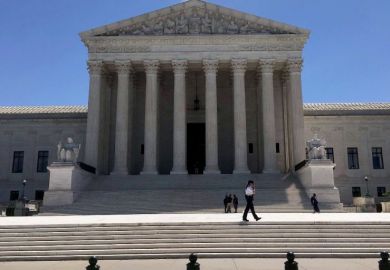A growing number of US public universities are taking steps towards ending scholarships aimed at helping racial minorities, making what their advocates see as an erroneous, harmful and politically driven interpretation of the Supreme Court’s ban on affirmative action.
In the latest major move in that direction, at least seven universities in Ohio began reviewing their scholarships after the state’s Republican attorney general, Dave Yost, warned them in recent weeks that such an assessment should be a part of complying with the US Supreme Court’s ruling.
Public institutions in Texas, Illinois, Missouri and Alabama, as well as the private Boston University, also appear to have responded to the court’s ruling by eliminating at least some scholarships meant to benefit racial minorities.
And that list is expected to expand further, as partisan activists keep up pressure, said James Murphy, director of career pathways and postsecondary policy at the advocacy group Education Reform Now. “I expect more to come,” he said.
The Supreme Court, after gaining a majority of conservative justices in the Trump administration, ruled in June 2023 – in cases involving Harvard University and the University of North Carolina – to overturn decades of precedent that had allowed racial preferences in admissions decisions.
Some conservative activists and policymakers quickly suggested wider implications of the Supreme Court’s logic for higher education, including the question of scholarships that benefit members of specific racial minorities.
And the activist who organised the cases against Harvard and UNC, Edward Blum, said he planned to begin investigations of cases where US colleges and universities made race-based distinctions in their financial aid packages.
“Excluding individuals by race or ethnicity in awarding financial aid, scholarships, internships and fellowships is gravely unfair and illegal. All institutions of higher education should end these discriminatory practices immediately,” Mr Blum said.
The actual number of colleges and universities retreating on scholarships is difficult to track nationally, Dr Murphy said, “because most of them are not loudly advertising it”.
A spokeswoman for Ohio University acknowledged that her 28,000-student institution was acting on the state attorney general’s request.
“Ohio University is working to complete a review of a small but important subset of gift agreements to determine which can proceed without language changes and which gift agreements may require a conversation with the donors regarding the implementation of revisions,” the spokeswoman said.
The University of Missouri took similar action shortly after the Supreme Court ruling, ending its minority scholarships under prodding by its Republican state attorney general.
The Biden administration, meanwhile, has been telling US institutions that such premises are mistaken. The administration was correct, Dr Murphy said, because the Supreme Court’s ruling against Harvard and UNC “was very limited in scope”, applying only to the consideration of race in admissions as practised by those two institutions.
And the opinion “never once uses the phrase ‘affirmative action’ and it does not discuss financial aid, recruitment strategies, DEI or really anything else but the consideration of racial identity in the admissions process”, he said.
Yet, Dr Murphy said, “it took less than an hour for some bad actors to wilfully misinterpret the decision to extend to a range of legal practices never discussed by the court”.
In cases where institutions were voluntarily eliminating race-based scholarships, that appeared to be a decision made by their legal counsels, “based on fear, rather than by leadership, based on mission”, he said.
Register to continue
Why register?
- Registration is free and only takes a moment
- Once registered, you can read 3 articles a month
- Sign up for our newsletter
Subscribe
Or subscribe for unlimited access to:
- Unlimited access to news, views, insights & reviews
- Digital editions
- Digital access to THE’s university and college rankings analysis
Already registered or a current subscriber?







